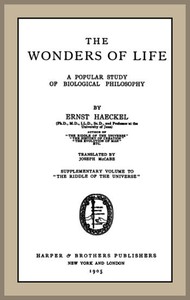The Wonders of Life: A Popular Study of Biological Philosophy by Ernst Haeckel
"The Wonders of Life: A Popular Study of Biological Philosophy" by Ernst Haeckel is a scientific publication written in the early 20th century. This work serves as a comprehensive exploration of biological philosophy, building upon the author's earlier work, "The Riddle of the Universe." Haeckel delves into the intricacies of life, the nature of living organisms, and the principles of monistic philosophy, providing insight into biological phenomena and their underpinnings. The beginning
of the book introduces the central themes of truth and the pursuit of knowledge, positioning biology within the larger framework of natural philosophy. Haeckel discusses the relationship between science and philosophy, asserting that true understanding emerges from a blend of empirical observation and rational thought. He critiques dualistic theories and emphasizes a monistic approach, promoting the idea that knowledge is inherently tied to physiological processes within the brain. In doing so, he sets the stage for a detailed examination of life, its definitions, and its complexities throughout the remainder of the text. (This is an automatically generated summary.)
Read or download for free
| How to read | Url | Size | |||
|---|---|---|---|---|---|
| Read now! | https://www.gutenberg.org/ebooks/46652.html.images | 1024 kB | |||
| EPUB3 (E-readers incl. Send-to-Kindle) | https://www.gutenberg.org/ebooks/46652.epub3.images | 401 kB | |||
| EPUB (older E-readers) | https://www.gutenberg.org/ebooks/46652.epub.images | 412 kB | |||
| EPUB (no images, older E-readers) | https://www.gutenberg.org/ebooks/46652.epub.noimages | 404 kB | |||
| Kindle | https://www.gutenberg.org/ebooks/46652.kf8.images | 678 kB | |||
| older Kindles | https://www.gutenberg.org/ebooks/46652.kindle.images | 593 kB | |||
| Plain Text UTF-8 | https://www.gutenberg.org/ebooks/46652.txt.utf-8 | 957 kB | |||
| Download HTML (zip) | https://www.gutenberg.org/cache/epub/46652/pg46652-h.zip | 371 kB | |||
| There may be more files related to this item. | |||||
Similar Books
About this eBook
| Author | Haeckel, Ernst, 1834-1919 |
|---|---|
| Translator | McCabe, Joseph, 1867-1955 |
| LoC No. | 05004789 |
| Uniform Title | Die lebenswunder. English |
| Title | The Wonders of Life: A Popular Study of Biological Philosophy |
| Note | Reading ease score: 45.6 (College-level). Difficult to read. |
| Credits |
Produced by Giovanni Fini, Marilynda Fraser-Cunliffe, David Garcia and the Online Distributed Proofreading Team at http://www.pgdp.net (This book was produced from scanned images of public domain material from the Google Print project.) |
| Language | English |
| LoC Class | QH: Science: Natural history |
| Subject | Biology |
| Subject | Evolution (Biology) |
| Subject | Life -- Origin |
| Category | Text |
| EBook-No. | 46652 |
| Release Date | Aug 22, 2014 |
| Copyright Status | Public domain in the USA. |
| Downloads | 238 downloads in the last 30 days. |
| Project Gutenberg eBooks are always free! | |


